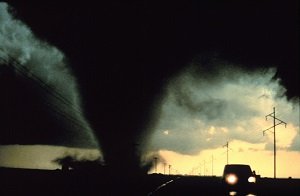Information report example provides the general form of information report and explores its basic structure. This type of work serves to reveal the facts about any conception or phenomenon to make a reader familiar with it and help him or her to take the right decision if the need arises. Information report example does not contain an argument, thus, it provides a reader with a neutral position concerning the subject of investigation.

The Storm
Basic Information
The storm is defined as a disturbed state of an environment within an atmosphere that significantly affects the nature of its surface and implies severe weather conditions. Usually, these abnormal conditions are associated with strong winds, hails, thunders, and heavy precipitations that create a crucial impact on people and their living facilities.
Forming
Generally, the storms appear when a system of high pressure surrounds that of low pressure in a center. Therefore, both opposing forces generate winds that may be transformed into a storm and subsequently create a crucially dangerous physical energy of an immense strength.
General Types of Storms
There are various types of storms that are distinguished by their strength and atmospheric disturbances they bring. The main types of storms include:
- Windstorms;
- Thunderstorms;
- Ice storms;
- Hurricanes;
- Blizzards;
- Tornadoes;
- Monsoon type storms.
Impact on Society
The weather circumstances created by the storms affect human society through the number of ways that impacts on a large variety of social, cultural, and natural resources. This relates not only to different economic aspects, such as infrastructure and transportation but human health as well. For instance, the storms may harm water and food supplies that mainly impacts those living in specific areas vulnerable to natural disasters.
As the strong winds are common for all the types of storms, they may destroy vehicles, buildings, bridges, and various outside buildings. Tropical cyclones, which form a considerable part of the storms occurring worldwide, may knock out electricity to hundreds of thousands of citizens. They may also generate the storm surges, or an increase in sea level, that is the destructive force to the human-made structures. In addition to the effect the storms have on a daily life of citizens and an economy of the state, it also affects agriculture and aviation.
Preventive and Protective Actions Performed by State
As the different types of storm occur during particular periods of the year, the states with vulnerable territories provide specific actions to protect its citizens and their property from sudden weather circumstances. They perform this activity through permanently monitoring weather conditions, cooperating with the international meteorological organizations, establishing construction regulations, defining the probable outcomes of each specific event, establishing well-equipped rescue teams, and training the population to make them ready to face any weather challenges.
Basic Instructions for the Population
In order to protect its citizens from any kinds of storms, the governments provide them with basic instructions on how to protect themselves. This includes a number of specific actions, where the most important are:
- Preparing and keeping at hand a survival kit for all the family members;
- Designating the meeting point for all the family in case the storm occurs;
- Closing all doors and windows and avoid leaving the house;
- Keeping calm and avoiding panic;
- Assisting neighbors and persons in difficulty;
- Listening to the radio but avoid using the telephone;
- Following the instructions provided by the authorities.
References
- Boulter, S., Palutikof, J., Karoly, D., & Guitart, D. (2013). Natural disasters and adaptation to climate change. Cambridge University Press.
- Favor, L. (2011). Natural disasters. New York: Facts On File.
- Shi, P. (2016). Natural disasters in China. Springer.
- Storms | Natural Disasters | ICDO. (2016). Icdo.org. Retrieved 11 July 2016, from http://www.icdo.org/en/disasters/natural-disasters/storms/
- Zschau, J. & Küppers, A. (2013). Early warning systems for natural disaster reduction. Berlin: Springer Science & Business Media.